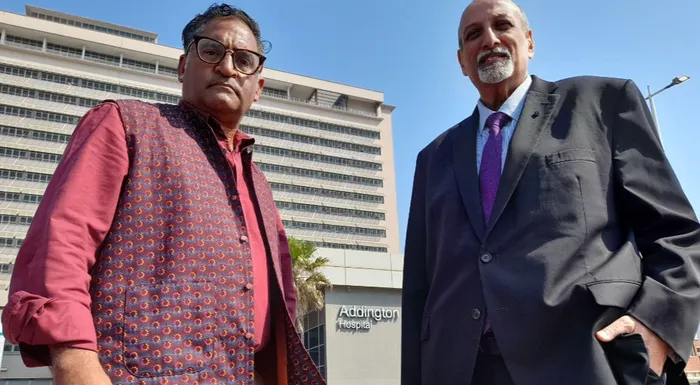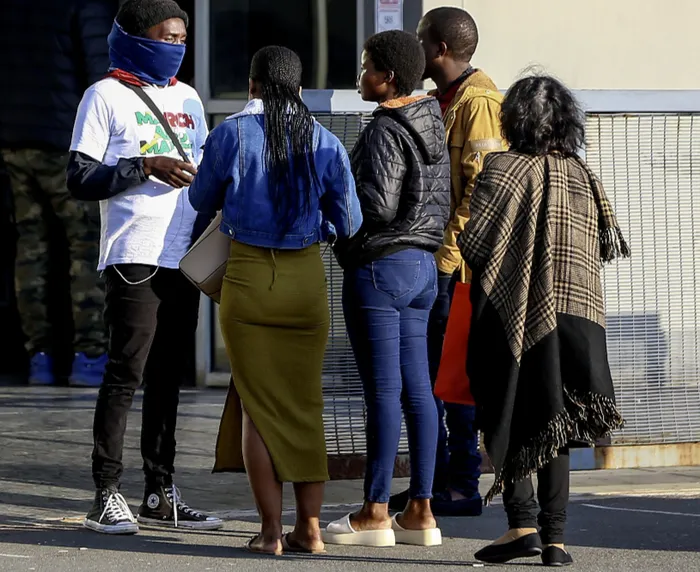What does it take for us to be outraged?
Emergency care

Dr Raymond Perrier and public health expert, Professor Salim Abdool Karim, outside Addington Hospital where they confronted vigilantes preventing foreigners from accessing medical care.
Image: Supplied
READERS of this column may already know about the actions of the self-appointed vigilantes outside Addington Hospital and other government facilities. They have been standing just outside the gates and demanding that anyone going into the hospital shows them their ID.
That in itself is a problem since an ordinary citizen has no legal basis to require someone to show them their ID.
But what they then do is so shocking. Because it is they who decide whether or not someone can access a medical appointment, collect medication, visit a sick relative, or accompany an elderly patient or a child into the hospital. They claim that they are not interfering with emergency care but, since they stand at the A and E entrance as well as the main door, they are obstructing access there as well – and they are not in any way equipped to assess whether someone’s health needs are urgent.
They argue that they are doing the Department of Home Affairs’ job for them by blocking access for ‘illegal migrants’. But that is false. DHA’s job is to control borders, or to check if migrants are breaking the law by, for example, working illegally. It is not a crime to go to a hospital.

A masked man stands guard outside the Addington Hospital requesting identity documents.
Image: Leon Lestrade/Independent Newspaper
In fact, it is a constitutional right since Section 27 states: “Everyone has the right to access healthcare including reproductive healthcare”.
There is no exclusion based on nationality or legal status. “Everyone” means everyone.
Subsequent legislation has confirmed that the right to healthcare is not limited only to South African citizens. Of course, the drafters of the Constitution and Parliament could have decided otherwise, but they have not. So, unless and until that is changed, that is what the law says.
It is understood that the right to healthcare is ‘progressive’ which means that how much healthcare is available will progress over time (in contrast to the right to vote which is an absolute right). But the rationing of healthcare cannot be based on a characteristic (like nationality) which is not relevant to someone’s health status – in the same way that a hospital with finite resources cannot choose to give preference to white people, or to Zulu people, or to short people.
Vigilantes
If it was only "illegal migrants" who were affected by these illegal actions, that would be bad enough. But it is not.
The vigilantes have blocked access for documented migrants (those with visas, permanent residence or refugee status); for naturalised South Africans (those born elsewhere but who are now citizens with ID cards); for people born in South Africa whom they deem do not ‘sound South African’; for South Africans who do not have an ID card (over 10% of citizens); for South Africans under the age of 16 who do not yet have an ID (though the protesters might graciously judge them to be South African); and for any South African who has just forgotten to bring their ID with them (or is reluctant to carry it for fear of theft).
So, they are physically preventing a whole host of people accessing healthcare. Moreover, that says nothing of the people who are now too frightened to go to the doors of the hospital and are staying away. A glance at the empty corridors at Addington shows clearly how big the impact has been.
This general description of what has been happening should make us anxious. But when we hear about specific cases, it is hard not to be incensed: the old lady with diabetes who cannot access her life-saving insulin, the amputee who was turned away from his physiotherapy appointment, the pregnant woman who needs a hospital delivery and cannot get one endangering her life and the life of her child, the man with TB who cannot access the higher level medicines he has been prescribed and so is putting himself and those around him at risk of developing drug-resistant TB, the 14-year-old who had to go in to the hospital on his own because his father was kept out, the young mother who bled to death because she was haemorrhaging and was too scared to go to the hospital.
We know all this at the Denis Hurley Centre because many of those who cannot get into Addington are coming distraught to our clinic in the hope that we can help even with our limited resources – our spend on medication has doubled as a result of what is happening.
Protest
Surely, all of this would prompt anyone with a degree of humanity to be demanding immediate action. After all, people’s lives are at risk. The hospital authorities would call in the police; the police would protect the patients; and the Minister and MEC for Health would be carrying out their sworn oath to uphold the Constitution.
And even if politicians do not care about poor people, do they not care about the reputation of the country? As Chair of the G20, South Africa is publicly calling on other countries to commit to ‘Solidarity and Equality’ – how can we say that with any credibility to the world’s health ministers while this is happening?
If what I have been describing started last week, they could be excused for not having acted yet. But in fact, it started seven weeks ago! So, for 50 days, literally hundreds of patients have been denied access to the healthcare which they need and to which they have a legal right. Meanwhile, hospital officials, the police and the politicians have done almost nothing to help.
Have we really become such a morally bankrupt society that we are happy to stand by and watch as people die in the heart of our city? It might be that people agree with the protesters that the law should limit access to healthcare – in which case we have political mechanisms that can be pursued. That is what it is to live in a democratic country.
Rule of law
It is the mark of a fascist régime that people can blatantly flout the rule of law, and politicians hide behind mealy-mouthed words to justify why they have not acted. This should be familiar since we had a fascist regime in South Africa until 31 years ago.
With great irony, the tactics of the vigilantes (who say they are defending South Africa) are straight from the playbook of the apartheid regime: demanding to see IDs is reminiscent of the Pass Laws; blocking access to Addington is exactly what happened when it was a whites-only hospital; letting the police play out their own prejudices and ignore what is happening before their eyes was true of SAP but we hope not of SAPS; politicians pandering to the biases of their voter base should not be the case now that they have a Constitution to guide them.
Apartheid
Just as during the days of apartheid, a number of groups in civil society have been working together to collect evidence about what is happening and to challenge these injustices. It is sad that we should even need to bring legal action to get the police to do their job – but that is exactly what some of us are doing.
One difference with the days of apartheid is the general silence of religious leaders. There has been a statement of condemnation by the Catholic bishops’ conference; and a handful of clergy did make time to join us in a stand of solidarity outside Addington last week.
But in the days of Archbishop Hurley, and when Diakonia was a force to be reckoned with, we would have seen dozens of religious leaders in robes and clerical collars – ministers, imams, rabbis, priests and bishops – publicly standing alongside the marginalised and accompanying them into the hospital. Perhaps some of them agree with the actions of the vigilantes. Many more seem too scared to challenge the bullies and try to prick their moral consciences.
If we, or they, think that it is too early to be outraged then let me offer a reworking of the words of Martin Niemoeller, a German Lutheran pastor who saw the impact of the Nazis at close hand. This should be a warning to us all: “First, they came for the illegals, and I did not speak out – because I was not illegal. Then they came for the foreigners, and I did not speak out – because I was South African. Then they came for those without IDs, and I did not speak out – because I had my ID. Then they came for me: and there was no one left to speak for me.”
Dr Raymond Perrier is Director of the Denis Hurley Centre in Durban, and Chair of the National Homeless Network.
** The views expressed do not necessarily reflect the views of IOL or Independent Media.
Related Topics: